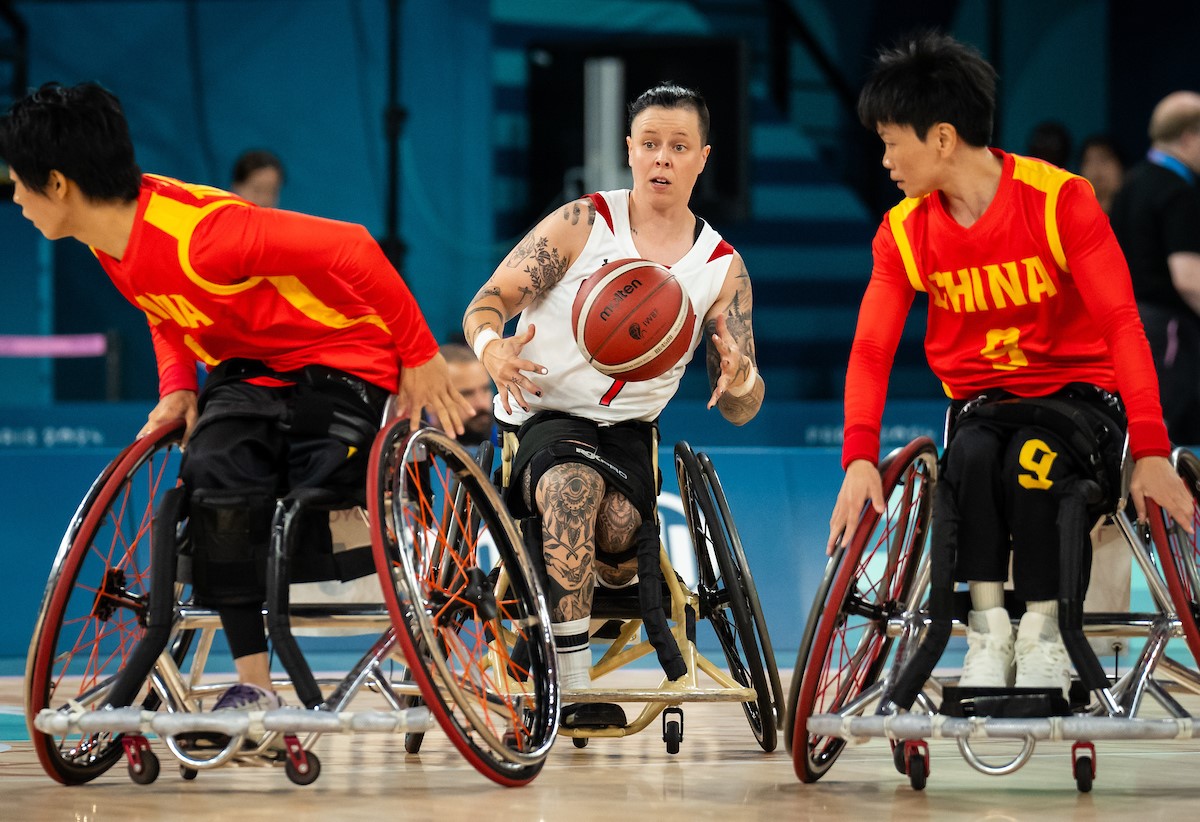Anti-Bullying Day hits home for Paralympians
Sports helped Ouellet, Riech and Lang rebound from dark days

OTTAWA – Allison Lang, Nate Riech and Cindy Ouellet all faced bullying in their youth and while the experiences were painful, sports were an outlet well before they became Paralympians.
February 26 is Pink Shirt Day, an annual event against bullying in Canada. It is an issue these Paralympians hold close to their hearts and have shared publicly.
Born without the lower half of her left leg, Lang grew up with very supportive parents and showed an early love for sport.
“When I got to school it became very hard for me,” said Lang, a member of Canada’s bronze medal winning sitting volleyball team at Paris 2024, a first-ever Games medal for the country in the sport.
“I was severely bullied, and I ended up struggling with my disability identity.”
When she played soccer, Lang was determined to hide her prosthetic leg and pulled her socks up above her knee.
She quit several sports because of what she calls a body dysmorphia (a mental health condition where a person spends a lot of time worrying about perceived flaws in their appearance).

But she turned her life around in her early 20s.
“I started all these practices of self-love and words of affirmation and getting to the roots of my purposes in life,” she said. “I wake up every morning now knowing that I’m choosing to be myself.
“I feel free.”
Lang says a lifelong participation in sport helped her cope with her perceived differences. She was hesitant about Para sport at first.
“I was at the lowest point of my life when I was invited to play sitting volleyball,’’ she said. “But I fell in love with it. I wasn’t great at it when I first started eight years ago.
“But I walked into the room and for the first time in my life, I was surrounded by impactful, powerful women that upheld what I wanted to be.’’
Nate Riech finds joy in sport
The years following his accident were not easy for world and Paralympic middle distance running champion Riech. He was subjected to teasing in school and the insensitivity of his classmates towards his challenges.
His condition was caused by a freak accident; a golf ball from 150 yards away hit Riech in the back of his head.
Riech was diagnosed with a brain injury which affects the right side of his body.
But sport was in Riech’s blood, and it was his therapy. His father Todd Riech competed at the 1996 Olympics in javelin, his mother Ardin Tucker was a pole vaulter for Canada, and his grandfather Jim Harrison played eight years in the NHL with the Maple Leafs, Blackhawks, and Bruins.
“I just love getting up and testing my limits,’’ he said in a 2023 interview with CPC. “I didn’t get in the sport to break word records. I got into it to see where my limit was, and I wanted to test that as much as I could.”

Ouellet sticks it to her bullies
Anybody who has seen Cindy Ouellet on a wheelchair basketball court won’t argue she is one of the best Para athletes in the world.
The six-time Paralympian’s education resume is as impressive as her sports career. She graduated in exercise science, earned a Masters in exercise physiology, and played wheelchair basketball for the University of Alabama.
She received an academic scholarship and earned a doctorate at the University of Southern California in Los Angeles in bio-medical engineering.
Ouellet started her PhD in neuroscience at Université Laval in Quebec City after the Paris 2024 Games. She also shares a business with her parents in building and selling adaptive equipment.
But being a star athlete, student, and businesswoman were far from her mind as she battled cancer in her teenage years. Some other kids even taunted her appearance caused by the treatments.
Today Ouellet is proud to be a spokesperson for Sport‘Aide in Quebec, a ground breaking and internationally acclaimed safe sport organization in Quebec.
Ouellet travels to schools across the province to address that sensitive subject.
“It’s also an opportunity to speak to the kids who might be the ‘bulliers’ and teach them at a young age that it is not OK to laugh at people who are different.
“It is still happening today but there is definitely more education going on and we are trying to get the message to kids and parents that they can ask for help through organizations like Sport‘Aide.
“We are seeing progress in that aspect.”
Support is out there
For kids dealing with bullying issues today, Lang says they need to realize they have friends and support.
“Try and find your community, a friend, an adult, a safe space where you can share your issues. It won’t be forever and the things you are being bullied for can sometimes become your superpower.”
Ouellet echoes those sentiments, explaining the importance of seeking help when bullied.
“It’s okay to seek help, it’s not a weakness,’’ Ouellet said. ‘’I’ve been incredibly fortunate in my athletic career to meet some amazing people who have helped me continue and grow as a person and an athlete.”
"*" indicates required fields
"*" indicates required fields